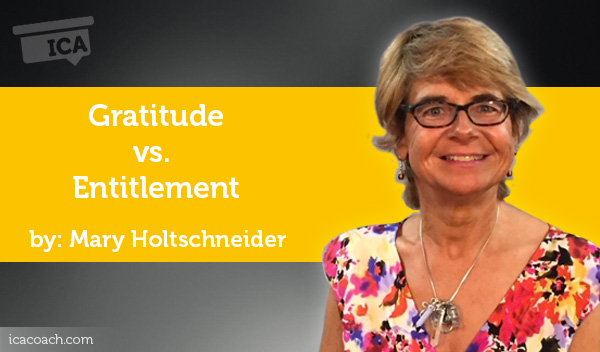
A Coaching Power Tool Created by Mary Holtschneider
(Healthcare Professionals Coach, UNITED STATES)
Gratitude, defined as the
quality of being thankful; readiness to show appreciation for and return the kindness,
is often discussed as something that is lacking in our society. It has been shown to have far-reaching effects on those who practice it regularly, including improved physical, mental, and emotional health and well-being.
According to psychologist researcher Robert Emmons, people who embrace feelings of gratitude, even when faced with seemingly negative situations, have stronger immune systems, lower blood pressure, and are more optimistic, joyful, forgiving, and compassionate. These individuals are also more generous, alert, and feel less lonely and isolated. They also become better “organizational citizens” as they manage the stresses of their work environment with greater ease than those who do not embrace living a life of gratitude.
Entitlement, defined as
the fact of having a right to something, or the belief that one is inherently deserving privileges or special treatment,
is generally discussed as something that is prevalent in our society. As opposed to Gratitude, Entitlement can lead to more negative feelings, as often what a person expects to receive is not given. Even government entitlement programs are not necessarily automatic, even though the name might imply that they are.
Exploring these concepts with a client can bring about a deeper understanding of what they expect from others, including people, institutions (such as the workplace), and society. For example, a client might feel that they are “entitled” to a promotion, yet it is not offered to them. Along with this can come feelings of disappointment, anger, regret, and animosity, which can be detrimental to the client’s well-being.
Examining these underlying emotions with the client by asking questions on how they are feeling, rather than asking questions about the “story,” can help them process what is going on within them. It is important to validate the client’s feelings regarding the situation before moving on to focus on feelings of gratitude.
For example, even though a client might feel that they are entitled to a promotion, the coach can explore what the positive attributes are of the client’s current job. By reframing the situation to looking at the positive, the client can start to move into an attitude of gratitude. To further move ahead, the coach might guide the client into considering ways to make changes to their current job that sets them up better for the promotion that is desired.
Facilitating a client to reframe a situation from a sense of entitlement to a sense of gratitude can take time over multiple sessions, as examining underlying beliefs and emotional responses might require the client to devote space to do internal processing.